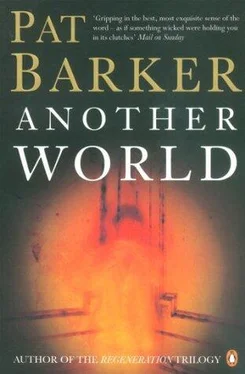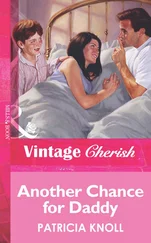‘You could go to the day room if you leant on me,’ Nick says.
He sees Geordie weighing the pain of the long journey against the delights of a cigarette when he gets there. ‘Aye, ho way.’
‘I don’t know,’ Auntie Frieda says. ‘You’re as bad as each other. You egg each other on.’
This is said in her ‘all men are children really’ tone. Nick can see Geordie being exasperated by it, but also, secretly, liking it — as he does himself.
‘I’m on if you are,’ Nick says.
The old man might have changed his mind after the pain of standing upright, but he grits his teeth and hangs on. Leaning heavily on Nick, shuffling along in his scuffed slippers, gasping for breath, he’s made it down the corridor, Frieda bringing up the rear with a blanket for him to sit on, and the longed-for cigarettes.
They sit at a little table with a heaped-up ash tray. A quiz show’s playing on television, blurred contestants against an improbably orange backdrop, but the day room’s empty except for a woman in a pink quilted dressing-gown with a shaved patch on her head, who sits at another table chain-smoking and staring blank-eyed at the screen.
‘Are you going to have one?’ Geordie asks Nick.
‘Yeah, I’ll join you,’ Nick says.
Geordie lights up, closing his eyes as he inhales. ‘Puts me back behind the bike shed, this does. Do you know I’ve gone a bit dizzy?’
A disgusted tsk from Frieda.
‘So what did he have to say, then?’ Grandad asks, fortified by his second drag.
‘Not a lot.’ Nick’s feeling his way.
‘Did he say when I can go home?’
‘No.’
Nick hears Auntie Frieda’s caught-in sigh of relief. She can’t cope, he thinks again. It’s asking too much. Grandad thinks of her as a young woman still. She’s his daughter, after all — how can she not be young? He doesn’t seem to see the reality of a woman in her seventies in failing health.
‘Did he mention the bayonet wound?’ Geordie asks.
‘He did, yes, well he mentioned it.’
‘I told him that’s what it was,’ he says, turning to Frieda, triumphant. ‘I said that’s what it was, didn’t I?’
What’s it all about, Nick wonders. The wound’s given him no trouble for eighty years, why on earth should he suppose it’s started playing up now? But it’s not just the wound that’s moved into the forefront of his mind. For years he’s been free of nightmares, flashbacks, hallucinations, all the dreadful baggage he brought back with him from France, yet in the last few months they’ve returned. His nights, recently, have been terrible to endure. Terrible to witness. Worse than that, he’s actually become quite dangerous. Auntie Frieda’s been mistaken for a German soldier more than once.
Geordie’s finding the hard seat and the upright posture more and more uncomfortable. He drags impatiently at his second cigarette, no longer enjoying it, just stocking up for the famine ahead.
‘That’s enough,’ Frieda says. ‘It’s time you were back in bed.’
He doesn’t argue, but stands up at once.
‘Are you coming back later?’ he asks Frieda, on their slow progress back to the ward.
‘Not tonight,’ Nick says, before she can answer. ‘I’ll look in again before I go.’
They get him back into bed and settled under the sheet. He eases himself right down, his sparse grey hair rucked up by the pillows, and lies flat at last. His hands flap like fish along the counterpane, unhappy with the hospital tightness of the sheets around him. He wants to pull the eiderdown up to his chin, and burrow down into the warmth the way he does at home. ‘Dress rehearsal for a bloody coffin,’ he complains.
‘Why don’t you try to sleep?’ Nick says, bending down to give him a hug.
The pale blue eyes fasten on his face. He’s disconcerted by their sharpness, their awareness of the unintended irony of his suggestion.
‘I’ll sleep soon enough.’
When they reach the end of the ward and turn to look back, he lifts his hand in a gesture that’s almost more a salute than a wave.
‘Trouble is, he thinks I should be there all the time,’ Frieda says, as they walk back to the car. ‘I don’t think he realizes what an awkward journey it is. I have to change buses twice.’
She’s enjoying her grumble, but Nick knows he mustn’t make the mistake of agreeing with her, because that will put her back into defensive mode. The wheel’s turned full circle. Grandad’s her baby now.
He unlocks the car door on her side, and sees her seat belt fastened before he turns the key in the ignition. There’s a smell of wood smoke in the air. Autumn with its pre-packaged nostalgia is just around the corner. He feels a passionate desire to cling on to the last of the summer. He won’t spend tomorrow covering up the wall painting, he decides; he’ll take Fran and the kids out somewhere instead, and then finds himself yawning. He feels too tired to concentrate on anything.
‘Perhaps if you told him what time to expect you? Then he’ll know how long he’s got to wait.’
‘Hm,’ Frieda says, unconvinced. She doesn’t want to be rescued. But she can relax in the car, doesn’t have to wait at that draughty bus shelter they’re just passing, full of women like herself with pinched faces, belts knotted tightly round non-existent waists, clutching plastic bags full of dirty nightdresses and pyjamas, looking up the road for a bus that doesn’t come.
‘You look tired,’ Nick says.
‘I haven’t been sleeping. Can’t sleep. When I was up and down to him all the time I used to think, Oh, if only I could have a good night’s sleep, but you see, I’m still listening for him. I was convinced last night I heard him get up and go out.’
Grandad’s taken to wandering. Or going out on patrol. One or the other.
The car heater’s making Nick drowsy. He opens the window on his side and a few spots of cold rain blow on to his face.
‘You know that thing they’ve got him in?’
‘What thing?’
‘You know, the white thing.’
‘The smock?’
‘Yes. Do they put you in that if they know you’re not going to get better?’
‘No, I don’t think so. It just makes bathing them easier. They don’t have to pull them about so much.’
‘Only I thought it might be easier for them to lay you out.’
She knows it’s cancer, but she belongs to a generation that can hardly bring itself to say the word. ‘The big C’ was as far as he’d ever heard her go to naming it, and that was explaining the death of a woman at the bottom of the street, a woman she hardly knew. How many of the reassuring things she says to Grandad does she believe herself, and does he believe them? Is anybody saying what they think? When he next looks at her she’s fallen asleep, hanging from the seat belt like a toddler from its harness. He concentrates on braking smoothly, and manages in this way to safeguard her sleep until they bump once, twice, over the sleeping policemen in the street outside her house. She blinks like an old tortoise, sits up straight, clasps her handbag with both hands, runs her tongue round her front teeth, pretends she has never not been awake.
‘Do the sleeping policemen work?’ he asks, as she fumbles her front-door key in the lock.
‘Do they heck as like. You’d think it was the dodgems round here.’
Inside, it’s a matter of moments only to light the gas fire and put the kettle on. She comes back, unwrapping her scarf, to find him sitting in one of the armchairs staring at the regular blue buds of flame. ‘I thought we’d just have a sandwich,’ she says. ‘If that’s all right?’
‘Fine.’
While she’s making them, he looks round the room at the photographs. Nick’s mother and Auntie Frieda as children, himself in his graduation gown, Miranda at various stages of development from newborn baby onwards. The photographs of Miranda stop abruptly at the time of the divorce. He must bring her some more up-to-date ones, he thinks, but then he’s hurt because several of the early photographs are of Barbara and Miranda together, but there are none of Fran and Jasper. When he first asked if he could bring Fran to see her, Frieda had said, ‘Leave it a bit, Nick. You know I’m mebbe a bit old-fashioned.’ It had spread to include even Jasper. She always asks after him, but it’s never ‘How’s my bairn?’ as it used to be with Miranda.
Читать дальше












